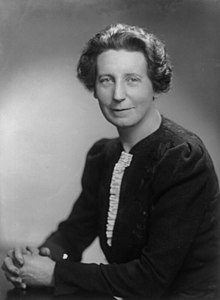Florence Horsbrugh, Baroness Horsbrugh
Florence Gertrude Horsburgh, Baroness Horsburgh GBE PC (born October 13, 1889 in Edinburgh , † December 6, 1969 there ) was a British politician of the Conservative Party and the third female British minister.
Life
After graduating from Lansdowne House in Edinburgh, she studied at St Hilda's College and Mills College in California . During the First World War she founded an organization for mobile kitchens. For this she became a member of the Order of the British Empire (MBE) in 1920 .
Florence Horsburgh was in 1931 for the first time as a candidate of the Conservative Party as a member of the lower house ( House of Commons ) elected and was this for the constituency of Dundee initially until her election defeat in the general election in 1945 to.
In 1939 she took over her first government office in the government of Prime Minister Arthur Neville Chamberlain as Parliamentary Secretary in the Ministry of Food and was also Commander of the Order of the British Empire (CBE). Between 1940 and 1945 she was Parliamentary Secretary in the Ministry of Health during the tenure of Prime Minister Winston Churchill before she was again briefly Parliamentary Secretary in the Department of Food at the end of the Second World War in 1945. In 1945 she also became a member of the Privy Council.
After an unsuccessful candidacy in the constituency of Midlothian and Peebles in the general election in 1950, she was re-elected to the lower house in the general election in 1951 , where she again represented the interests of the Conservative Party in the Manchester Moss Side constituency until 1959 . Shortly after the election, Prime Minister Churchill appointed her Minister of Education , although she did not initially have any cabinet rank, but only became Cabinet Minister and thus a member of the Cabinet in 1953 . She was only the third female minister in a British cabinet after Margaret Bondfield and Ellen Wilkinson . In 1954 she left the government. She was then appointed Dame Commander of the Order of the British Empire (DBE).
From 1955 to 1960 she also represented the interests of the United Kingdom as a delegate to the Council of Europe and the Western European Union .
After leaving the House, it was in 1959 as a life peer with the title of Baroness Horsburgh , of Horsbrugh in the County of Peebles in the nobility raised and belonged until her death as a member of the upper house ( House of Lords ) to.
Quote
"Making a good pudding - one that really stands - satisfies me more than any speech I've ever given from the House of Commons' bench."
literature
- Florence Horsbrugh , in: Internationales Biographisches Archiv 04/1970 of January 12, 1970, in the Munzinger Archive ( beginning of article freely available)
Web links
- United Kingdom Ministers (Guide To Women Leadership)
- Janus: The Papers of Florence Horsbrugh, Baroness Horsbrugh
- Dame Florence Horsbrugh at Hansard (English)
- Center for Advancement of Women in Politics
Individual evidence
| personal data | |
|---|---|
| SURNAME | Horsbrugh, Florence Horsbrugh, Baroness |
| ALTERNATIVE NAMES | Horseburgh, Florence Gertrude Horseburgh Baroness |
| BRIEF DESCRIPTION | British politician, Member of the House of Commons |
| DATE OF BIRTH | October 13, 1889 |
| PLACE OF BIRTH | Edinburgh |
| DATE OF DEATH | 6th December 1969 |
| Place of death | Edinburgh |
